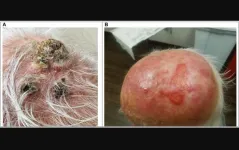(Press-News.org) Papillary craniopharyngiomas (PCPs) are a rare type of brain tumor that cause substantial morbidity for patients. While surgery and radiation are often used to treat PCPs, incomplete removal of the tumor and toxicity from radiation can leave patients with life-long health challenges after treatment, including neuroendocrine dysfunction or vision or memory loss. Investigators from the Mass General Cancer Center, a member of the Mass General Brigham healthcare system, led the first multicenter treatment protocol in this rare tumor. The study was based on laboratory discoveries by Mass General Brigham researchers who studied the genetic drivers of PCP growth, uncovering that existing cancer medications can directly interfere with faulty genes in PCPs to halt their progression and drastically reduce their size. Based on this breakthrough, investigators treated 16 patients with a BRAF/MEK inhibitor as part of a phase II clinical trial and found that tumors shrank by an average of 91 percent. Results are published in the New England Journal of Medicine.
“All patients who completed one or more cycles of therapy responded to treatment, which is the highest response rate to date of any medical therapy for brain tumors,” said first author Priscilla Brastianos, MD, director of the Central Nervous System Metastasis Center within the Mass General Cancer Center. “These unprecedented results signal a paradigm shift for targeting brain tumors because they show that, with the right target and the right drugs, precision medicine can have a dramatic impact on brain tumors.”
Prior to this study, the laboratories of Brastianos and Sandro Santagata, MD, PhD, of Brigham and Women’s Hospital’s Department of Pathology, demonstrated that approximately 95 percent of PCPs have a type of mutation in the BRAF gene, known as the BRAF V600E mutation, which drives their cancerous activity. This type of mutation is also present in some forms of melanoma. Recently, therapies that inhibit BRAF and a related gene, MEK, have been approved by the U.S. Food and Drug Administration for treating melanoma and some other cancers, leading the researchers to hypothesize that a BRAF/MEK inhibitor (vemurafenib/cobimetinib) might also be effective for treating PCPs.
In this multicenter, phase II trial, conducted by the National Cancer Institute-funded Alliance for Clinical Trials in Oncology Network, the researchers first screened PCP patients across the country for BRAF V600E mutations to identify candidates for the study. Sixteen patients at nine centers were enrolled in the study, and 15 ultimately completed at least one, 28-day cycle of the therapy. Over the course of four cycles, the median reduction in tumor size was 91 percent, with a range of 68 to 99 percent. Seven patients received no other treatment after discontinuing vemurafenib/cobimetinib and six have not demonstrated evidence of tumor progression at a median follow-up of nearly two years. No patient’s tumor progressed while on vemurafenib/cobimetinib, and none have died.
Notably, patients did experience adverse reactions to the drugs. Three patients discontinued treatment due to adverse events, with one patient discontinuing therapy after eight days due to anaphylaxis and acute kidney injury. The most common adverse events were rashes, reported by six patients. Still, many patients tolerated the drugs well, electing to continue therapy beyond the four prescribed cycles as a result of their positive response to it.
Future research may determine the optimal number of cycles of vemurafenib/cobimetinib for PCP patients. The researchers are also advancing additional precision medicine clinical trials for patients with meningiomas and brain metastases. Both use precision medicine approaches similar to the one used here to screen patients for biomarkers that indicate that their cancers may be treatable with existing therapies.
“This study demonstrated that national, biomarker-driven trials are feasible for patients with brain tumors,” Brastianos said. “Moving the needle on treating rare brain tumors truly requires a multidisciplinary and multi-institution effort, and we were able to highlight that through our research.”
Mass General Brigham team: Drs. Priscilla Brastianos, (neuro-oncology), Sandro Santagata (neuropathology), Frederick Barker (neurosurgery), Helen Shih (radiation oncology), John Iafrate (pathology), William Curry (neurosurgery), Dan Cahill (neurosurgery) and Elizabeth Gerstner (neuro-oncology).
Disclosures: Brastianos has consulted for Angiochem, Genentech-Roche, Lilly, Tesaro, ElevateBio, Pfizer, SK Life Sciences, Advice Connect Inspire, Axiom and Dantari, received institutional grant/research support from Merck, BMS, Mirati and Lilly and honoraria from Merck, Genentech-Roche, Pfizer and Lilly. A full list of disclosures is available in the article.
Funding: Research reported in this publication was supported by the National Cancer Institute of the National Institutes of Health (U10CA180821, U10CA180882 and U24CA196171 to the Alliance for Clinical Trials in Oncology and UG1CA232760, UG1CA233178, UG1CA233180, UG1CA233320, UG1CA233331, UG1CA233339, UG1CA189824 and U10CA180868). Research was also supported by funds from Genentech and philanthropic support from Alexandra Drane and grants to Brastianos from the Damon Runyon Cancer Research Foundation, the Breast Cancer Research Foundation and the Terry and Jean de Gunzburg MGH Research Scholar Fund.
Paper cited: Brastianos, P et al. “Phase II trial of BRAF/MEK inhibition in newly diagnosed papillary craniopharyngiomas” New England Journal of Medicine DOI: 10.1056/NEJMoa2213329
###
About Mass General Brigham
Mass General Brigham is an integrated academic health care system, uniting great minds to solve the hardest problems in medicine for our communities and the world. Mass General Brigham connects a full continuum of care across a system of academic medical centers, community and specialty hospitals, a health insurance plan, physician networks, community health centers, home care, and long-term care services. Mass General Brigham is a nonprofit organization committed to patient care, research, teaching, and service to the community. In addition, Mass General Brigham is one of the nation’s leading biomedical research organizations with several Harvard Medical School teaching hospitals. For more information, please visit massgeneralbrigham.org.
END
A groundbreaking study published today reveals the critical yet severely understudied factor of salinity changes in ocean and coastlines caused by climate change. The study was co-authored by an international team of researchers, including Dr. Cliff Ross, University of North Florida biology chair/professor, and Dr. Stacey Trevathan-Tackett, UNF biology graduate program alum and research faculty member at Deakin University in Australia.
Changes in salinity, or salt content, due to climate change and land use can have potentially devastating impacts on vital coastal and estuarine ecosystems, yet this has rarely been studied until now. This new research provides valuable ...
Two University of Texas at Arlington faculty members have received Fulbright U.S. Scholar Program awards from the U.S. Department of State and the Fulbright Foreign Scholarship Board.
Kevin Schug, Shimadzu Distinguished Professor of Analytical Chemistry in the Department of Chemistry and Biochemistry, will travel to Palacky University in Olomouc, Czech Republic, continuing a decades-long relationship that began during his days as a graduate student.
Ling Xu, associate professor in the School of Social Work, will use the award to travel to Taiwan and embark on 10-month project to raise awareness about the ...
In a new study, researchers and members of the Muwekma Ohlone Tribe of the San Francisco Bay Area are the first to publish evidence of wealth-driven patterns in maternal investment among ancient populations.
Ancestors of the Muwekma Ohlone living 2,000 years ago at Kalawwasa Rummeytak in present-day Silicon Valley in California’s San Francisco Bay Area, placed high value on women’s economic contributions to their communities, according to the study. Women stayed in the villages in which they were born, and their male partners moved from their birth communities to join their wives’ families. Women’s intimate knowledge of the local ecology and female ...
Food insecurity rate hits 17% for the second time in 18 months
WEST LAFAYETTE, Ind. – Reported food insecurity has reached 17%, matching the rate last reached in March 2022, according to the June Consumer Food Insights Report. The new report also includes consumer changes in food spending as a result of a hypothetical recession and sentiments on artificial intelligence.
The survey-based report out of Purdue University’s Center for Food Demand Analysis and Sustainabilityassesses food spending, consumer satisfaction ...
EMBARGOED FOR RELEASE UNTIL 4 P.M. ET, WEDNESDAY, JULY 12, 2023
MINNEAPOLIS – Older people who have little social contact with others may be more likely to have loss of overall brain volume, and in areas of the brain affected by dementia, than people with more frequent social contact, according to a study published in the July 12, 2023, online issue of Neurology®, the medical journal of the American Academy of Neurology.
The study does not prove that social isolation causes brain shrinkage; it only shows an association.
“Social isolation is a growing problem for older ...
“Our data demonstrate that cetuximab plus radiotherapy represents an active treatment option for laCSCC, with manageable toxicity.”
BUFFALO, NY- July 12, 2023 – A new research paper was published in Oncotarget's Volume 14 on July 7, 2023, entitled, “Effectiveness and toxicity of cetuximab with concurrent RT in locally advanced cutaneous squamous cell skin cancer: a case series.”
Treatment for locally advanced cutaneous squamous cell cancers (laCSCC) remains poorly defined. Most laCSCC tumors express high levels of epidermal growth factor receptors (EGFR). Cetuximab has activity in other EGFR expressing cancers and enhances the effectiveness ...
The University of Texas at Arlington received an Award of Excellence for Innovation from the International Parking & Mobility Institute (IPMI).
The award was for the RAPID (Rideshare, Automation and Payment Integration Demonstration) program, a self-driving shuttle system for students and the general public that started in 2021. It was originally funded through the city of Arlington and a Federal Transit Administration grant, with additional support from the North Central Texas Council of Governments. Via Transportation Inc. and May Mobility also are partners in the program.
RAPID, the first program in the United States to integrate on-demand, ...
The incidence of primary involuntary childlessness, the rate of women seeking treatment for infertility, as well as the success rate of assisted reproductive technology all increased in birth cohorts studied from 1916 to 1975, according to a new study published this week in the open-access journal PLOS ONE by Finn Egil Skjeldestad of the Arctic University of Norway.
There have been tremendous advances in assisted reproductive technologies (ARTs) over the past 50 years. In the new study, Dr. Skjeldestad analyzed data on 11,064 women born between 1916 and 1975 ...
Ice Age saber-tooth cats and dire wolves experienced a high incidence of bone disease in their joints, according to a study published July 12, 2023 in the open-access journal PLOS ONE by Hugo Schmökel of Evidensia Academy, Sweden and colleagues.
Osteochondrosis is a developmental bone disease known to affect the joints of vertebrates, including humans and various domesticated species. However, the disease is not documented thoroughly in wild species, and published cases are quite rare. In this study, Schmökel and colleagues identify signs of this disease in fossil limb bones of Ice Age saber-tooth cats (Smilodon fatalis) ...
A new mathematical model of UK cat populations suggests that neutering of cats that belong to people not only affects the population dynamics of owned cats, but also affects feral, stray, and shelter subpopulations. Jenni McDonald of Cats Protection and co-authors present these findings in the open-access journal PLOS ONE on July 12.
More than ten million cats live as owned pets in UK homes, and hundreds of thousands of additional cats live in shelters or as free-roaming feral or stray cats. Cats may transition from any of these subpopulations to another. However, while many prior studies have investigated cat population ...








